Minutes and Memories
Mellencamp reminds us of the joys — and pitfalls — of wallowing in nostalgia
Memory and nostalgia are funny things. As I push 60, it’s rare to find a day when I’m not leafing through the mental rolodex, reliving lessons learned from past victories and mistakes.
Even though the pass-fail ratio is not what I’d like sometimes, I try to avoid becoming mired in the past. I have no desire to relive or recapture my youth, and the antenna of my inner cynic is always on the lookout when someone threatens to take me back to the “good ole’ days.”
Many of those days were not good. Yes, some were. And yes, they informed who I am today as a partner, parent, person, and professional. But to me, nostalgia is a slippery slope, one that can lead us to deceive ourselves about the past, present, and future.
One thing I’ve always appreciated about John Mellencamp is his canny understanding of the lure, value, and danger of nostalgia. The word permeates a number of his best-known songs — many of them recorded more than 30 years ago — and it remains a draw to the fans who see his shows hoping to relive a part of their youth.
But Mellencamp also is a contrarian and a contradiction — a hardcore liberal who continues to live in conservative Indiana, a touring musician who plays theaters rather than arenas and calls his shows “performances” instead of concerts, and a self-professed “Little Bastard” who challenges audiences through his songs and over their behavior at shows.
All of those characteristics — and more — were on display when Mellencamp brought his “Live and In Person 2024” tour to the 3,700-seat D.A.R. Constitution Hall in Washington, D.C. last week. The show featured no opening act, a 23-minute series of clips from old and classic films, and a 19-song set that included only four numbers recorded after 1989.
It could have been a trainwreck. Thankfully it wasn’t.
‘Heartland’ Gateway
As much as I like to blame my politics on the Norman Lear-produced sitcoms of the 1970s, it was the music of the 1980s — and the blind eye that our nation turned to the AIDS crisis — that started the slow change of my outlook on society and life.
And, ironic as it may seem, my gateway drug was “heartland rock.”
The first 18 years of my music-listening life were spent largely in the bubble of my father’s record collection — a mix of 1950s singles from his teenage years with the occasional easy listening, opera, and Broadway soundtrack added for flavor.
Once in a while, something current popped onto the turntable — my mom loved Willie Nelson’s “Stardust” and anything by Kenny Rogers — but with the exception of the occasional one-hit wonder single, our family pretty much stayed away from the classic rock era.
Slowly, as I navigated the torturous path of puberty and adolescence into high school, I realized I would have to “get with the times” and add some contemporary sounds to my personal jukebox. But, with the exceptions of Fleetwood Mac and Tom Petty and the Heartbreakers, I wasn’t enamored with the music of the late 1970s and early ‘80s that was popular in my Texas Gulf Coast hometown.
Country: Too saccharine, except for Willie and a bunch of artists I didn’t know yet.
Classic rock of the late 1970s (Boston, Foreigner, and Styx): Meh…
Metal (AC/DC, Molly Hatchett, Rush, and Van Halen): Nope, with minor exceptions, not for me.
Yacht rock: Oh, hell to the no.
Disco: Have you seen me walk, let alone dance?
Punk/New Wave: What was that? (I would soon find out…)
During my senior year in high school, I had become a fan of Mellencamp, whose rise to commercial success coincided with my slowly expanding taste. In the fall of 1983, as I was starting at the University of Houston, he released “Pink Houses” as a single. The video on MTV was perfect for the channel, and the “ain’t that America for you and me?” chorus was tailormade for the Reagan-era nostalgia that fueled our country at the time.
Reagan’s rose-colored, capitalism first, patriotic fervor promoted a return to the pre-Vietnam/Civil Rights era comfort of white middle class America. That in turn brought great comfort to my mostly conservative parents, following a decade of my father’s illness and severe financial strain caused by the gas crisis and rampant inflation.
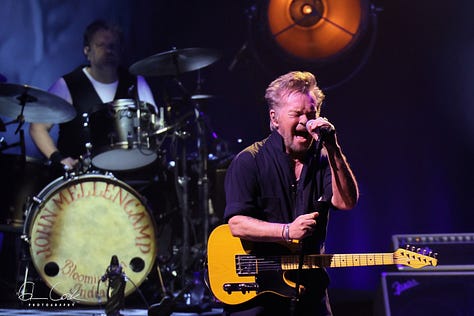
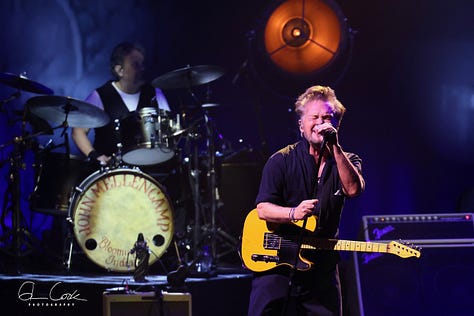


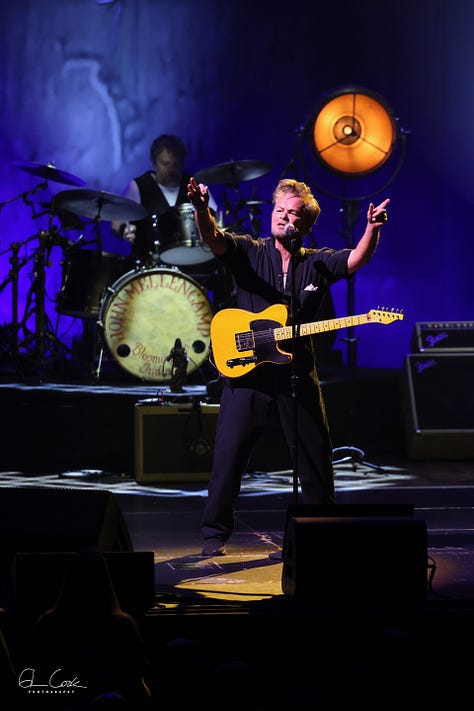

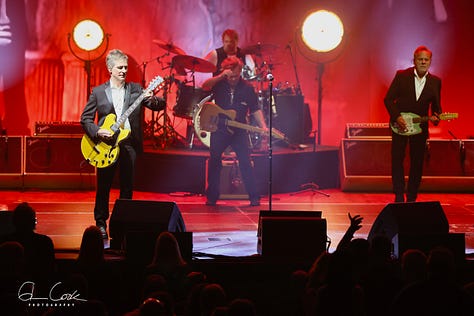


“Pink Houses” followed “Hurts So Good” and “Jack and Diane,” two hits that found Mellencamp — then known as “John Cougar” — mining much of the same territory that Petty and Bruce Springsteen had discovered a few years earlier. But with his new album, he reclaimed his given name, eventually dropping Cougar entirely, and turned nostalgia on its ear.
“The Reagan era had ushered in a conservatism and hyper-consumerism,” writes Warren Zanes in his excellent book, Deliver Me from Nowhere, that looks at the making of Springsteen’s “Nebraska.” “Deregulation allowed unchecked growth for already powerful institutions, and those who stood to benefit tended not to hesitate in taking what they could get. The divide between the very wealthy and the very poor would grow, and it would define American life in new and lasting ways.”
By placing a deceptive, simple earworm into a song with much deeper meaning, a trick that Springsteen would pull off the next year with “Born in the U.S.A.,” he criticized Reagan’s politics and the divide that only continued to grow.
And surprisingly — or not, if you think about it — the audience came in droves, many getting lost in the chorus and not listening to the verses surrounding it.
On subsequent albums, Mellencamp would venture further into social issues, using nostalgia as a hook. And for the most part, his audience — including me — followed along.
Over the past four decades, I’ve learned a great deal about the issues Mellencamp raises in “Pink Houses.” And the more I see the rich get richer, creating an ever-deeper divide that promotes power and denigrates the perceived weakness of the disadvantaged, the more disturbed I am.
A True ‘Performance’
Mellencamp’s setlist has not changed during this tour, which ends on Wednesday (April 24), but the artist and his crack six-piece band did anything but phone it in. The result was a tremendously entertaining evening.
His emphasis on “performance” — signs in the lobby and the final card from the clip show implored the audience to “exercise theater etiquette” — was evident throughout. But the edict was tested early as the “clip show” — scenes from “The Fugitive Kind,” “The Misfits,” “Giant,” “The Grapes of Wrath,” “Hud,” and “A Streetcar Named Desire” — played on the screen.
The clips showcased rebels, misfits and outlaws of different kinds played by Marlon Brando, James Dean, Clark Gable, and Paul Newman, among others. As the child of a movie-loving father, I knew all of the clips, and probably was one of only a few that realized “Giant” had been transferred from color to black and white.
Each clip set a definite mood, even as the audience started to become impatient, which I have to think was part of Mellencamp’s point. Knowing the audience wanted comfort food, he gave it to them, with a dollop of Tabasco to add spice.
Now 72, Mellencamp remains engaging and charismatic, moving around with the energy of someone 20 years younger. A longtime chain smoker, his singing voice is raspy and gravel-soaked, but he knows how to work around it, using the deficit of age to give his best-known hits the combination of joy and melancholy.
Mellencamp and his band took the stage with “John Cockers,” one of three songs played from 2008’s “Life, Death, Love, and Freedom” during the show. The song’s refrain (“I ain’t got no friends”) was quickly rebuffed, however, when the string of 1980s hits began.
Seven songs followed in rapid succession. “Paper in Fire” segued into “Minutes to Memories” then “Small Town” into “Human Wheels.” Mellencamp slowed it down for the plaintive “Jackie Brown,” starting the song in a semi-circle with guitar players Mike Wanchic and Andy York and violinist Lisa Germano. Then, after “Troubled Land” came the first of the massive singalongs — “Check It Out” from 1987’s “The Lonesome Jubilee.”
Germano’s violin was a huge part of the sound of “The Lonesome Jubilee,” and her entrance on “Check It Out” remains one of the most joyous instrumental pieces I’ve heard three and a half decades after its release. She left Mellencamp’s band in the mid 1990s for a solo career and did not return until last year. Seeing her back in the fold, particularly on these songs, was a highlight of the show.
Down a Side Road
With the audience hooked, Mellencamp veered left for a three-song interlude. On acoustic guitar and harmonica, he talked about the homeless before playing “The Eyes of Portland,” the lone cut from his most recent album, 2023’s “Orpheus Descending.”
“One of the advantages of this job is that I get to travel a lot, but I can tell you one thing, in this country we are f——d up with homeless people,” he said as a lone man’s boo was heard in the quiet concert hall.
Earlier in the tour, Mellencamp’s confrontation with a “Don’t preach, just play the hits” fan over his monologue went viral. But on Thursday, the boo-bird was shrugged off, by the singer and the rest of the audience that drowned him out with applause.
The interlude continued with another story from Mellencamp about his grandmother, who lived to be 100 and said he wouldn’t make it that far if he didn’t stop “cussing and smoking.” The last time she saw him, she pointed an arthritic finger at him and said, “You’re gonna find out life is short, even in its longest days.”
That line became the centerpiece of “Longest Days,” a song that appeared on “Life, Death, Love, and Freedom,” the themes of which have dominated the past 15 years of Mellencamp’s life as a musician and visual artist. York and Troye Kinnett, playing accordian, rejoined during the song, which was followed by “Jack and Diane.”
One of Mellencamp’s biggest and most enduring hits, “Jack and Diane” tells the universal story of the high school sweethearts you find in every small town, and Germano’s violin returned to emphasize the point that “life goes on, even after the thrill of living it is gone.” Then, again emphasizing the “performance” piece of the show, Mellencamp left the stage for a brief break while Germano and Kinnett accompanied Joanne Woodward’s narration of “The Real Life.”
Hearing Woodward’s voice again — the 94-year-old actress no longer speaks due to Alzheimer’s disease — served as an audio coda to the clip show that features icons (including Woodward’s husband, Paul Newman) who are no longer with us.
At this point, Mellencamp returned to the stage and to the hits — a powerful “Rain on the Scarecrow,” “Lonely Ol’ Night,” “What If I Came Knocking,” “Crumblin’ Down,” “Cherry Bomb,” and the closer “Hurts So Good.”
And, of course, “Pink Houses.”
Before “Cherry Bomb,” itself a love song to the “good ole’ days,” Mellencamp acknowledged the nostalgia factor of his current performances. He laughed telling a story about his son, now 30, asked if he remembers things that happened just two years ago and said, “You have to be old to have old times.”
It was nice to relive those songs, at least for a minute, with a favorite musician who feels at this point like an old friend. At the same time, the show served as a reminder to be grateful for the now, to not be fooled by nostalgia’s lure. I hope others felt the same way.
This essay has been expanded from a review written and published on Monday, April 22, for Americana Highways. To see more photos from the show, go to my Flickr album here.



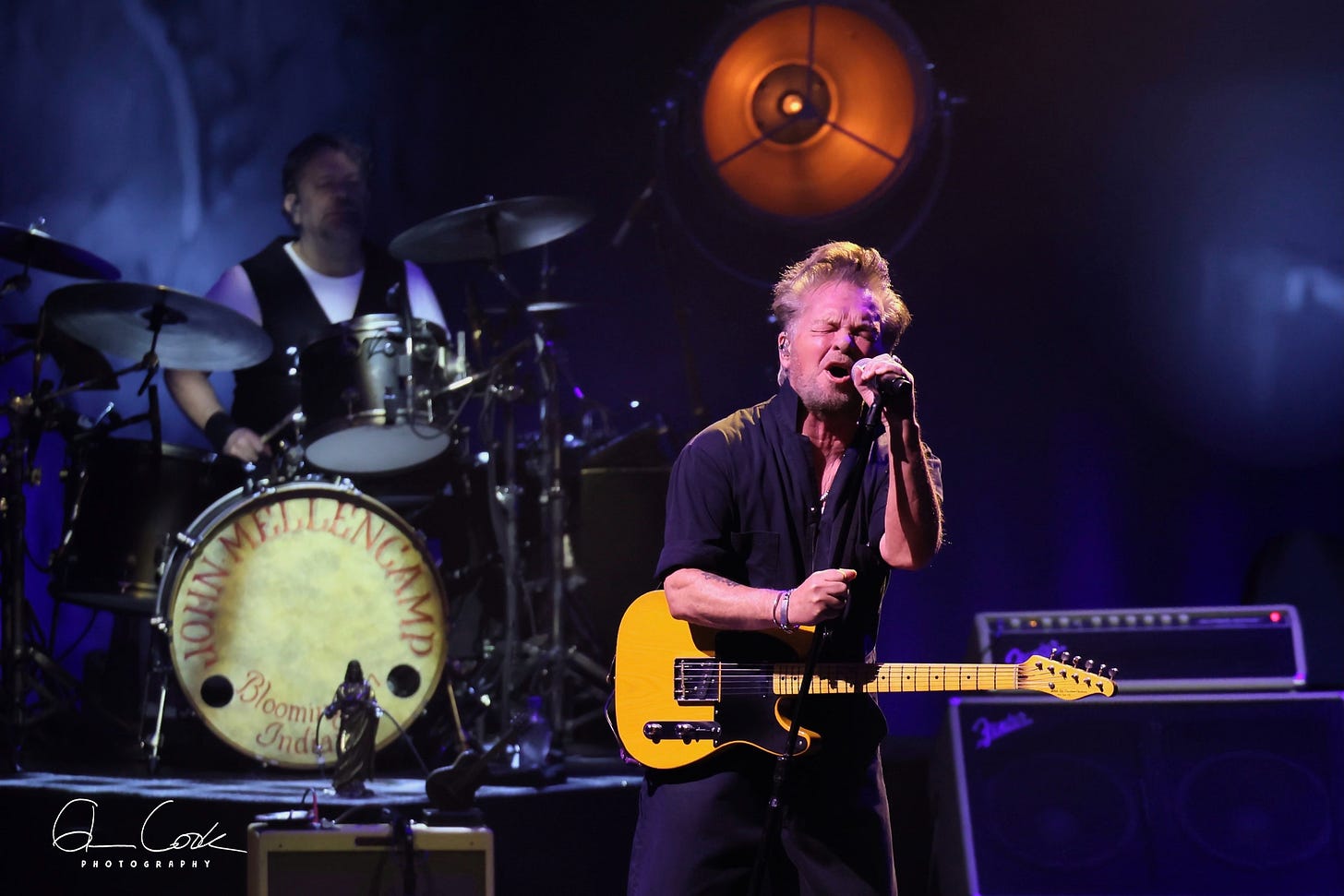
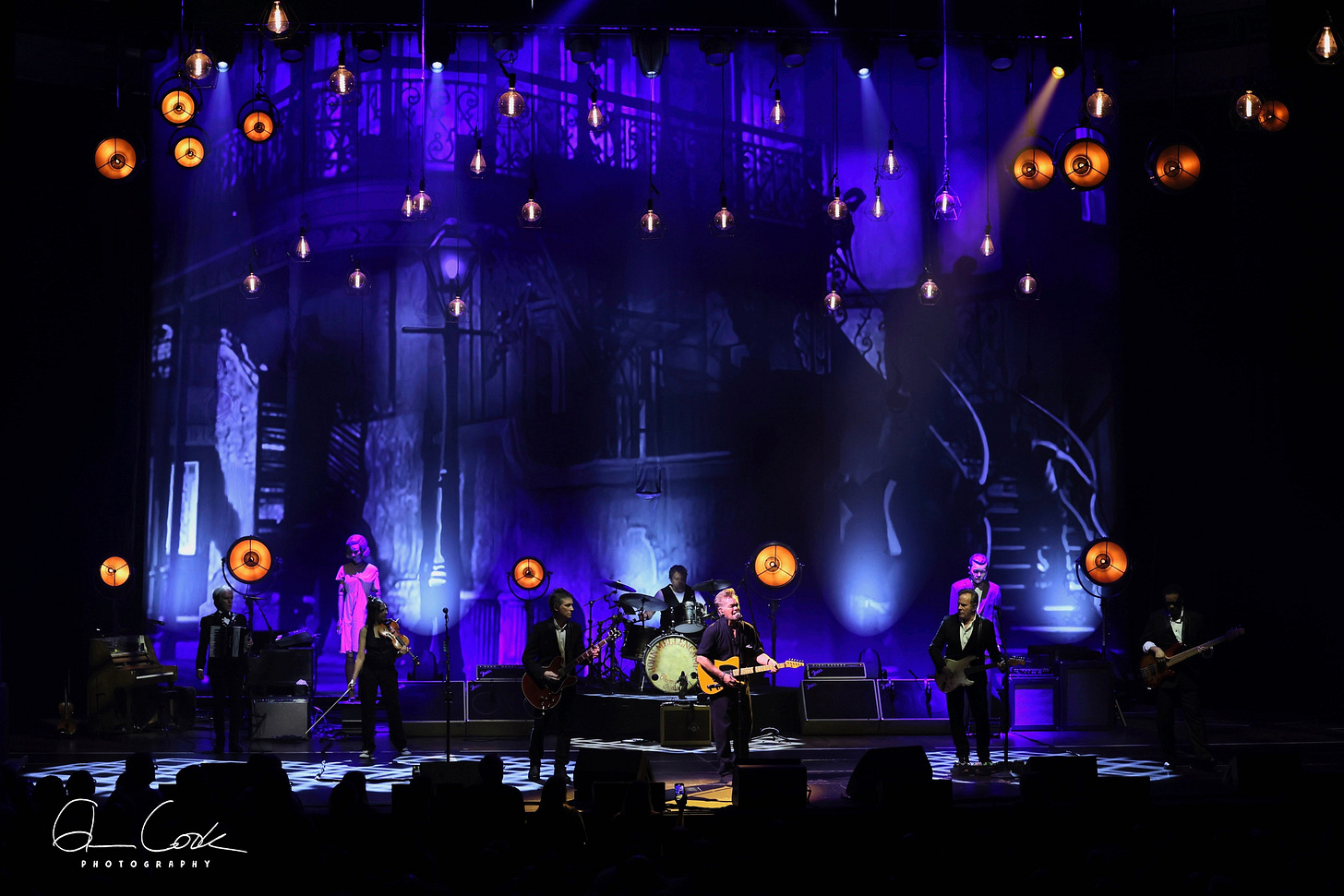


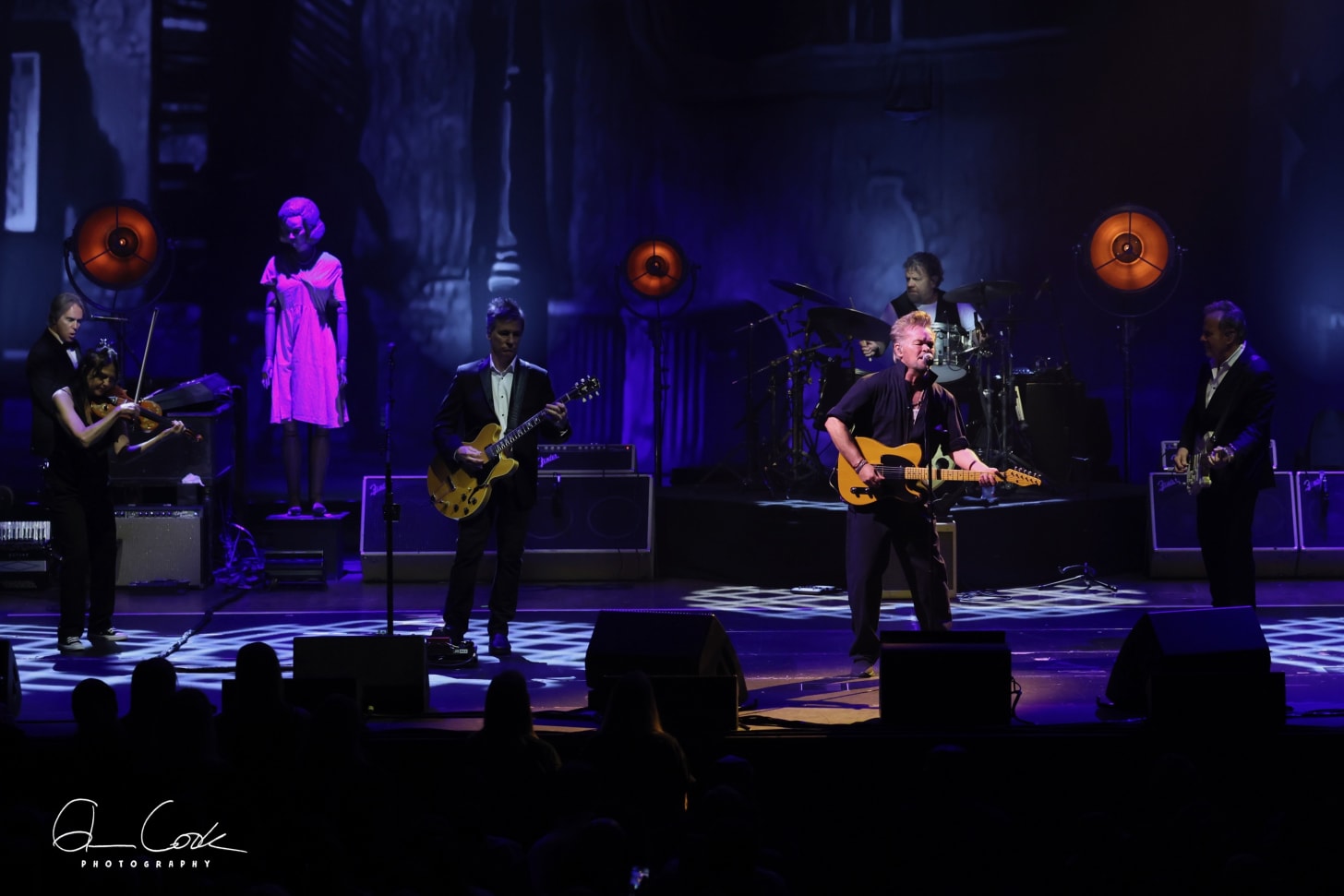
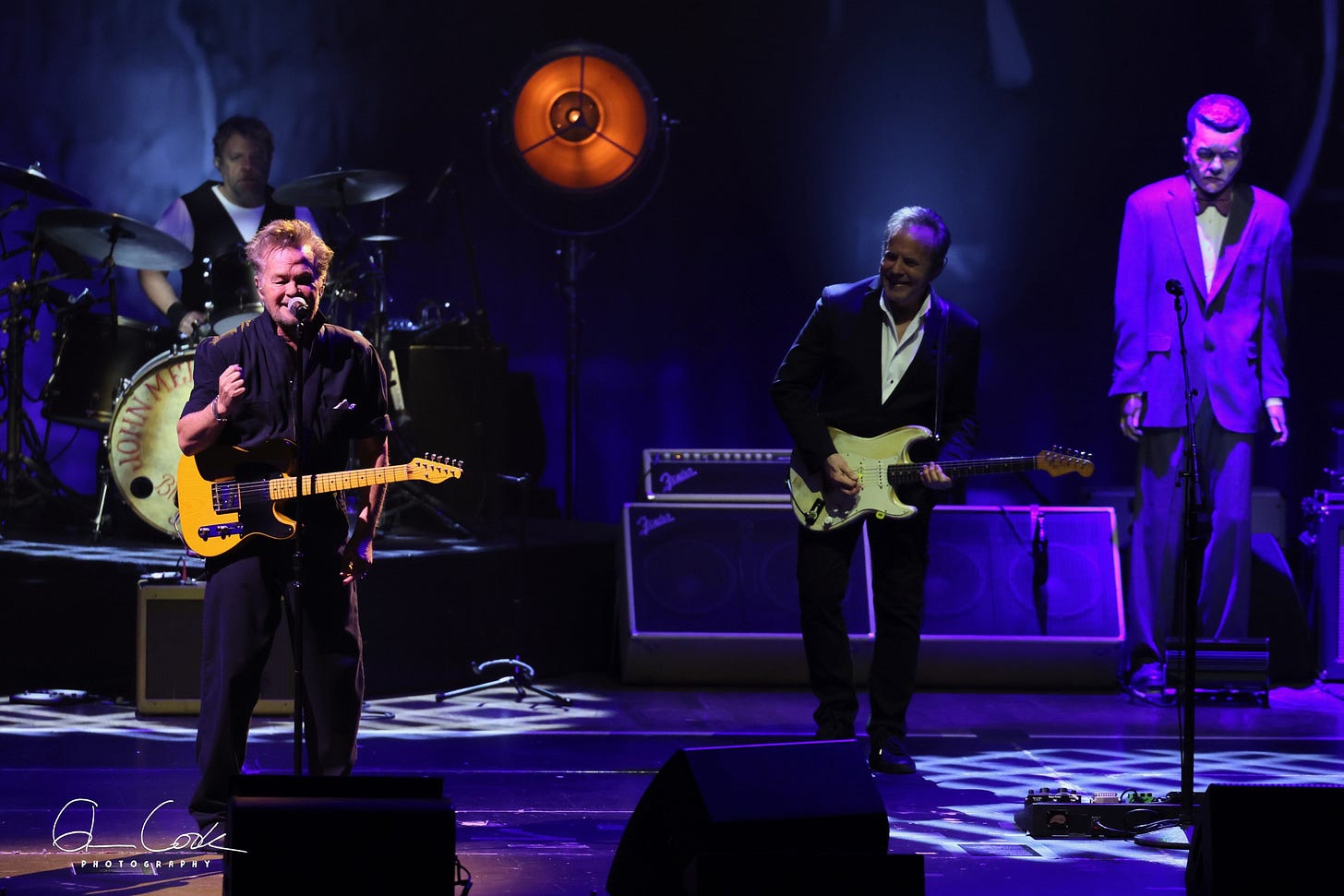
Great piece, Glenn. And, as always, amazing photos. I enjoyed listening to him being interviewed by Marc Maron on WTF last year. He talked a lot about how painting has been his passion for the last while, less so music. Did he share anything about his art? It is funny how much he pop-poos nostalgia in both interviews and song yet this sounded like a pretty nostalgic show. I mean performance.